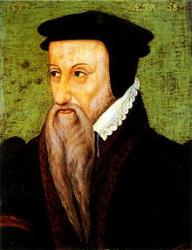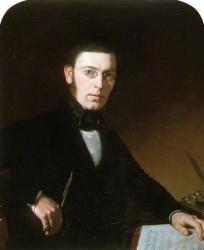Planning worship?
Check out our sister site, ZeteoSearch.org,
for 20+ additional resources related to your search.
- |
User Links
Person Results
Allen William Chatfield
1808 - 1896 Person Name: Allen W. Chatfield Translator of "The first Eternal Mind was law to all" in Songs and Hymns of the Earliest Greek Christian Poets Chatfield, Allen William, M.A., born at Chatteris, Oct. 2nd, 1808, and educated at Charterhouse School and Trinity College, Cambridge, where he was Bell's Univ. Scholar and Members' Prizeman. He graduated in 1831, taking a first class in classical honours. Taking Holy Orders in 1832, he was from 1833 to 1847 Vicar of Stotfold, Bedfordshire; and since 1847 Vicar of Much-Marcle, Herefordshire. Mr. Chatfield has published various Sermons from time to time. His Litany, &c. [Prayer Book] in Greek verse is admirable, and has been commended by many eminent scholars. His Songs and Hymns of Earliest Greek Christian Poets, Bishops, and others, translated into English Verse, 1876, has not received the attention of hymnal compilers which it merits. One hymn therefrom, "Lord Jesu, think on me," is a specimen of others of equal merit, which might be adopted with advantage. He died Jan. 10, 1896.
-- John Julian, Dictionary of Hymnology (1907)
Allen William Chatfield
Théodore de Bèze

1519 - 1605 Person Name: Théodore de Bèze, 15159-1605 Author of "As a Deer in Want of Water (Como el ciervo ansioso brama)" in Santo, Santo, Santo Bèze, Théodore de, born at Vezelay, in Burgundy, 1519; died 1605. Bèze’s father was of noble birth. He occupied the post of bailiff at Vezelay. Bèza received a first-rate classical education under Melchior Wolmar. Before he was 20 he wrote some poetry in imitation of Catullus and Ovid, the licentiousness of which he mourned and condemned in alter years. A brilliant prospect of Church emoluments turned his attention from the distasteful study of law. The income of the Priory of Longjumeau made him rich, and he became a prominent member of the literary world at Paris. But his entrance into Orders was barred by a secret marriage with Claudine Denosse. Subsequently, when the offer of the abbey of Froidmont by his uncle made it necessary for him to decide between avowing his marriage and renouncing the prospect, or repudiating his wife, he decided, under the solemn conversion produced by a dangerous illness, to abandon the Roman Church, and break with his whole past life. He left for Geneva (1548), and there publicly married. His first scheme for a living was to join his old comrade Jean Crespin, then at Geneva, in printing; but his appointment to the Professorship of Greek at Lausanne (1549), left the printing office in the hands of Crespin. Before his departure fiom Geneva ho had been on intimate terms with Calvin; and the discovery of a metrical rendering of Ps. 16 on Beza's table at Geneva led Calvin to suggest to him the completion of Marot's Psalms. At Lausanne he became a friend of Viret. He stayed there ten years, during which he wrote a tragi-comedy, and 40 of his metrical Psalms (36 published in 1551, 6 more in 1554). He had whilst at Lausanne a narrow escape from death by the plague. In 1557 he went with Karel and Budams to ask for the intercession of the German Protestant Princes in behalf of the persecuted Hugue-nots, and had interviews with Melanchthon. In 1559 he was appointed pastor at Geneva, Assistant Professor of Theology to Calvin, and the first Rector of the newly founded College of Geneva. With Peter Martyr and others he represented the Huguenots in the conference with the Queen-Mother and Cardinal Lorraine, at Poissy (1561), and remained at Paris nearly two years afterwards. His French metrical Psalter, in continuation of Marot, was completed in 1562. Calvin's death, 1564, left Beza the foremost figure at Geneva. In 1571, at the summons of the King of Navarre, he presided at the Synod of the Reformed Churches at Rochelle; and again (1572) at Nismes. His wife died in 1588, and he married again soon afterwards. His public life, as a theologian, a preacher, and administrator, ceased about 1598, though he preached again for the last time in 1600. He was honoured till his death; only three years before which the Landgrave of Hesse visited him, when passing through Geneva. The works of Beza are very numerous. As a controversialist, a commentator, an investigator of the text of the New Testament, he occupied a high place in his time. Among his chief works are: Annotationes in N. T.., 1556; Novum Testamentum, 1556; Psalms, with paraphrase in Latin, 1579; Life of Calvin, 1563. [Rev. H. Leigh Bennett, M.A.]
-- John Julian, Dictionary of Hymnology (1907)
Théodore de Bèze
Martin E. Leckebusch
b. 1962 Person Name: Martin Leckebusch Author of "Lord, I Gladly Trust" in Psalms for All Seasons
Martin E. Leckebusch
Helen Otte
b. 1931 Person Name: Helen Otte, b. 1931 Author of "O God, Be Merciful to Me" in Psalms for All Seasons Helen Ann (Brink) Otte Walter (b. Grand Rapids, MI, 1931) versified this psalm in 1982 for the Psalter Hymnal. She received her education at Calvin College, Grand Rapids, Michigan, and has worked as a teacher, proofreader, and librarian. She was a member of the Poets' Workshop that worked with the revision committee to prepare psalm versifications for the 1987 Psalter Hymnal. After her first husband died and she remarried, she remained active as a freelance writer, especially of children's stories and dramas, some of which have been published in Reformed Worship under the name Helen Walter.
Bert Polman
Helen Otte
John Ambrose Lloyd

1815 - 1874 Person Name: John Ambrose Lloyd, 1815-1874 Composer of "BRYNTEG" in The Cyber Hymnal
John Ambrose Lloyd
Ella W. MacGill
Person Name: Ella MacGill Harmonizer of "LAMENT" in Redemption Songs
Ella W. MacGill
Robert Archibald Smith
1780 - 1829 Person Name: Robert Smith Adapter of "MARTYRDOM" in Lift Up Your Hearts Although largely self-taught, Robert A. Smith (b. Reading, Berkshire, England, 1780; d. Edinburgh, Scotland, 1829) was an excellent musician. By the age of ten he played the violin, cello, and flute, and was a church chorister. From 1802 to 1817 he taught music in Paisley and was precentor at the Abbey; from 1823 until his death he was precentor and choirmaster in St. George's Church, Edinburgh. He enlarged the repertoire of tunes for psalm singing in Scotland, raised the precentor skills to a fine art, and greatly improved the singing of the church choirs he directed. Smith published his church music in Sacred Harmony (1820, 1825) and compiled a six-volume collection of Scottish songs, The Scottish Minstrel (1820-1824).
Bert Polman
Robert Archibald Smith


 My Starred Hymns
My Starred Hymns



